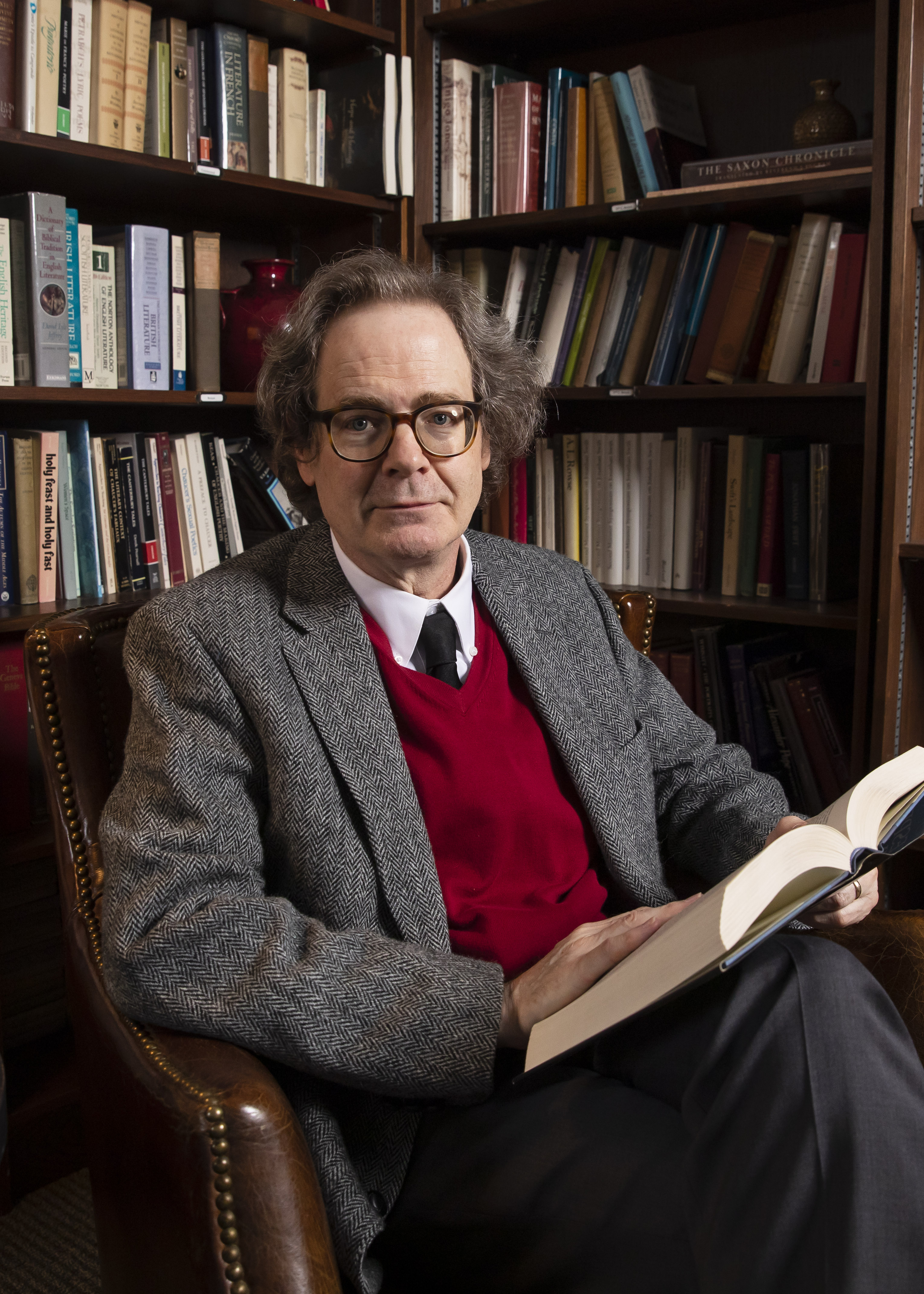Christopher J. Scalia’s 13 Novels Conservatives Will Love (But Probably Haven’t Read) is a good primer, but I would not recommend it to anyone who can identify Hemingway and Henry James by their styles. At least a few aging conservatives will recall the difference between James’s lavish interweaving of clauses and the short, piecemeal sentences of Hemingway. What connects the two authors is their knowledge that artistic form can shape how we grasp reality. This artistic knowledge, which burst into new life among French painters and poets during the Belle Époque, goes back a surprisingly long ways in English literature, because the formalist instinct is always recognizing it. You can hear it in Hamlet and see it in George Herbert’s “Easter Wings.” Its relevance, in a technological age when nature often seems to imitate art, should not be underestimated. Such concern for form and style is not intrinsically political.
Scalia has other fish to fry, however. He presents 13 novels in terms of their political dimension. He writes in a clear, friendly middle-style that gets in no one’s way. He is terrific at literary pointers: a diamond of analysis here, a nugget of comparison there. But the novels under discussion do not have a natural, organic connection. Their purely chronological arrangement frustrates the literary mind. In fact, Scalia impresses with the confidence and ease with which he sidesteps the dense terrain of literary criticism. Literary form and literary history are scarcely on the menu, and this lack will bother you only if you are aware that other, finer menus exist.
To be sure, Scalia has his share of virtues. Not only does his appreciation for literature easily surpass that of the average English professor. His choice of representative passages shows real taste and sensibility. He is never smug or pretentious. He wears his learning lightly, and his joshing is quick and pleasant. My implacable reservation is that Scalia makes literature a means—an honored and valued means, but nevertheless a means—to a political end.
In what sense is such a book timely? To answer that question, I must summon the author of The Idea of a University. Newman’s use of the word science is classical, but his argument is modern: “I observe, then, that, if you drop any science out of the circle of knowledge, you cannot keep its place vacant for it; that science is forgotten; the other sciences close up, or, in other words, they exceed their proper bounds, and intrude where they have no right.” The forces that laid waste to a thousand English Departments, even before AI arrived on the scene like an extraterrestrial scavenger, left a gaping hole for the science of politics to—as Newman suggests—intrude where it has no right. The last embattled defenders of literature died or were stranded. That is why, instead of encountering such names as Harold Bloom, Denis Donoghue, Christopher Ricks, David Bromwich, Helen Vendler, David Mikics, Rosanna Warren, John Briggs, Sarah Spence, William H. Pritchard, Michael Gorra, and the like, we find a Who’s Who of conservative punditry at harbor in Scalia’s pages: William F. Buckley, Ross Douthat, Jonah Goldberg, Irving Kristol, Rush Limbaugh, Rich Lowry, Peggy Noonan, and Jason Riley, to name a few.
This does not strike me as a promising development. As an English professor and a political moderate, I have paid an exorbitant price for maintaining the courage of my convictions. My enemies have resorted to insults, ostracizing, turning students against me, and, most recently, contriving a Title IX case that reads like a farcically updated version of To Kill a Mockingbird. But having stood my ground against a vicious and unprincipled left, I must stand my ground against a seemingly well-intentioned right. Rich Lowry is an admirable man, an unusually thoughtful journalist, and a lover of Shakespeare. But he is not a judge of Shakespeare’s relation to the native drama, or to Marlowe, or to Shelley’s The Cenci. I hope you see my point. The literary world is vacated—not salvaged—by the elevation to the rank of authority of journalists whose expertise lies elsewhere. In this respect, Scalia’s work sets a dismal precedent.
Politics has a place in literature, much as ethics has a place in politics, or chemistry a place in biology. Disciplinary boundaries are porous and variable, but the “circle of knowledge” holds only when scholars deliberately conserve the integrity of their disciplines. One proviso: The best interdisciplinary work will explore the interface between fields, and, if such work leads to the death of one discipline or the birth of another, so be it. The disciplines are naturally competitive and dynamic.
In Scalia’s defense, then, one might approach 13 Novels Conservatives Will Love (But Probably Haven’t Read) as an interdisciplinary study. His finest chapters support this approach because they combine literary insight with political nuance. Unlike the academic leftist who only has eyes for Mao, Scalia can entertain multiple perspectives. He sifts through moral and political ambiguity in Walter Scott’s Waverley, Nathaniel Hawthorne’s Blithedale Romance, George Eliot’s Daniel Deronda, Willa Cather’s My Ántonia, Evelyn Waugh’s Scoop, and Muriel Spark’s The Girls of Slender Means. He comments thoughtfully on Zora Neale Hurston’s life and work before he brings in the conservative Big Guns and starts blasting. He is at his pithiest and sharpest in his discussion of Waugh, a chapter I am grateful to have read. The four chapters on recent novels are too political to attract my literary interest. It strikes me as the merest journalistic twaddle to count them among “the countless great works” of literature. Good grief. All in all, though, the argument in Scalia’s favor is substantial enough for me to award the book an overall grade of B—a respectable mark before the era of grade inflation.
I would like to make a few connections between writers, of the kind absent from Scalia’s book, to suggest what I consider to be its deficiencies. His opening chapter on Samuel Johnson’s Rasselas is an intelligent work of extraction and synthesis, highlighting Johnson’s thematic concern for “well-ordered desire.” Scalia’s choice of quotation is effective for his purposes, and he enriches his viewpoint with references to James Madison and Thomas Sowell. Absent from the chapter, though, is the gloomiest of Johnson’s reflections on imagination, a touchstone of his thinking that is remarkable for its poetic handling of unpoetic materials. Imlac, the Johnsonian sage, comments to Prince Rasselas on the pyramid they are visiting: “It seems to have been erected only in compliance with that hunger of imagination which preys incessantly upon life, and must always be appeased by some employment.” Samuel Beckett extends this daunting insight in his novels, though his love of Johnson is lost on pedestrian critics. It does not surprise me that Scalia can find no use for Beckett, a Nobel laureate and undoubted master of English prose with a proliferating influence. Beckett simply doesn’t fit with Scalia’s approach. He is not political (whatever the left likes to think) or marketable or cheery. And yet he is one through whom the language lives.
Along similar lines, Scalia writes perceptively on V. S. Naipaul and his 1979 novel A Bend in the River. But there is a side—a significant side—of Naipaul that derives from Joseph Conrad, another author whose spirit forever eludes the political mill. Heart of Darkness, a prophetic book for Naipaul, has no political calculus. Perhaps the Conradian essence appears in a passage from Lord Jim:
It was solemn, and a little ridiculous, too, as they always are, those struggles of an individual trying to save from the fire his idea of what his moral identity should be, this precious notion of a convention, only one of the rules of the game, nothing more, but all the same so terribly effective by its assumption of unlimited power over natural instincts, by the awful penalties of its failure.
Conrad does not defer to Scalia’s desire for literature that “shows us how to live.” I do not think Naipaul does either. One recalls Eliot’s contempt for Matthew Arnold’s definition of poetry as “a criticism of life.” Like Conrad and Beckett, Eliot knew about the abyss. To invoke Nietzsche’s dichotomy in his celebrated Birth of Tragedy, Arnold was too Apollonian for Eliot’s tastes, which recognized the Dionysian depths. Scalia is Apollonian, almost as Apollonian as Thomas Mann’s Gustave von Aschenbach. Many conservatives are not.
How, then, can a conservative reader avoid the politicization of everything? Hesiod says the Muses were born to be “a forgetfulness of evils, and a truce from cares.” Arnold, when he quoted these words, was not suggesting that literature should ignore the reality of evil. He was envisioning literature as a stay against madness and chaos, a respite from the usual frenzy, a recovery of perspective in the face of crises that bark at us from every corner like Cerberus unleashed. If novels can deliver such expansive leisure, then they are well worth their price.
We may add to this primary defense of novel-reading the pleasures of amateurism in its best sense, the excitement of a reading public that knows what’s good and that prefers high literary achievement to censorship. If Queen Elizabeth hadn’t known what was good, she would have thrown Shakespeare in jail after a provoking revival of Richard II. Conservatives should celebrate the life of culture. They should honor its rites and restore its privileges. The progressive movement, like socialism more generally, is a buzzkill and thin ground for great art. It especially distrusts masculine individuality. It has nonetheless profited from the legacy of an earlier liberalism—one thinks of Lionel Trilling as a representative figure—that brought high literary standards to classrooms, periodicals, and publishing houses. The more conservative readers, the better, but what we do not need is propaganda posing as fiction and criticism. Life is hard enough without making the Muses pull a dogcart.

